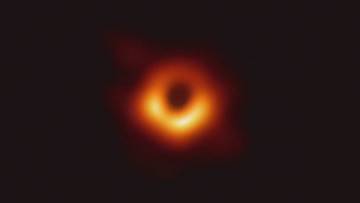
Black hole, image courtesy of NASA/JPL
Science can feel exclusive – reserved only for those with the highest degrees and the most laboratory hours. But it shouldn’t feel this way. Science is at the very core of what makes us human. It is a desire to explore and understand everything around us. Science is a curiosity-driven, awe-inspiring yearning to know. You don’t need to be in a lab to be scientific. You can still be scientific in the same way that someone (like me) who has never picked up a flute can still appreciate music. Science is woven through our society, our politics, our media, and our philosophy.
Even if you don’t have a career in a STEM field, you should still care about science because:
You have to vote on this stuff
The responsibility of governing new scientific advancements belongs to the public, and this responsibility is only growing. To put into perspective the incredible rate of growth, this year alone researchers gave mice infrared vision, a black hole was imaged for the first time ever, AI found traces of an undiscovered Homo sapiens species, and the first commercial quantum computing system was released.
Science is vulnerable to misinformation. You will likely have to vote on something related to genetic engineering or modification soon, and this field is widely misinterpreted. Another field that demands our attention is climate science. An overwhelming percentage of global scientists agree that humans are causing global warming, which demands new policy regarding our energy usage and industry practices. At the Science Center, these are two areas of concern that we are working hard to educate the public on because legislating these areas improperly could have devastating effects. Having a population of informed and scientifically literate voters means that we are less likely to fall victim to fearmongering and false information. It will mean that our laws are based on good evidence and reason which will keep us, and our world, safer.
Healthcare is safer when we know more
Another area where developing a robust scientific literacy could help you is medicine. The plague of the “Groundbreaking New Study Finds…” article is only worsening. In an effort to increase engagement, some headlines and articles can take research out of context, wildly oversimplify, or infer and make dangerous connections that didn’t exist in a study. An example of this is the infamous “Science Says A Glass of Red Wine Can Replace 1 Hour Exercising.” As much as I want this headline to be true, it simply isn’t. This study actually found that a compound found in red grapes called Resveratrol could increase the capacity for exercise in rodents. For humans to see any benefit, you would have to drink 100-1,000 bottles of red wine very quickly, and even then you wouldn’t experience the effects of cardiovascular exercise. Instead, you could be a little more motivated to work out, and also dead from alcohol poisoning. While this example is more humorous than dangerous, scientific studies taken out of context can have some tragic consequences. They can lead people to stop seeking medical attention, give patients false hope for a miracle cure, or make scientists seem less credible. Having a healthy, scientific skepticism can help you prevent yourself from falling prey to the clickbait headlines.
The more scientifically literate the public is, the safer healthcare is for all of us. Medication errors are a significant issue, especially in older patients. Studies have shown that when people are informed, they not only drastically reduce the number of medication errors due to their own actions, but they can catch about 3% of errors caused by other people such as their doctor or pharmacist. That could be lifesaving.
Studies have also shown that health literacy is a stronger indicator of someone’s health than their age, income, and race. Patients who are not informed have higher mortality rates, have less control over chronic conditions, are less likely to use preventative health measures, and spend more money on healthcare services . Being scientifically literate will not only save you time and money, but it could quite literally save your life.

Darwin’s version of an evolutionary tree, from his original notebooks
Our sense of self
An advance in science is an advance in our collective understanding of our world and ourselves. For much of humanity’s history, everyone believed that the Earth was at the center of the universe. Copernicus put forth his mathematical model of a solar system that had the Sun at the center, and our worldview was forever changed. We had to come to terms with the fact we were scientifically not the center of the universe. Can you imagine how mind-blowing that shift in perspective must have felt?
Or think about when Darwin proposed his theory of evolution. His theory was one of biological change and impermanence. Suddenly humans were faced with the idea that we were not placed on this planet exactly as we appear today — which can shatter some ideas of species superiority. Now we have to contend with the idea that we are the way we are because of a long line of random changes to our genetics. We are part of the entire messy, random, and incredible system that has been quietly shifting and modifying life on Earth.
Today we live in a time when we have mapped entire human genomes and can genetically engineer organisms. Genes can be synthesized in a lab. Sheep can be cloned. We are living in a time in which humans have increasing control over genetics, the building blocks of life itself. This has the potential to shift our worldview and our view of ourselves possibly more than the revelations of Copernicus and Darwin. Science shapes us and it changes how we see our own species.
Finally…
Science is for all of us. Scientists, engineers, mathematicians, inventors, and healthcare workers don’t advance their fields solely to benefit themselves. They do it to create a better understood and experienced world for all of us. Taking the time to develop a more robust scientific literacy can help us take advantage of everything these advancements have to offer. It will help us legislate ourselves to a safer world, maintain our health, and understand what it means to be human.

Aoife Ryle is a STEM Educator at the Connecticut Science Center. In addition to working with school groups, she works with our Teen Program, Overnights department, and shoots weekly science segments for WFSB. She has a degree in Bioengineering from the University of Maine and has a personal interest in the life sciences and engineering which makes bioengineering a perfect crossover.
